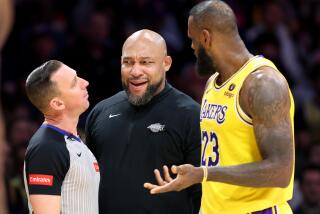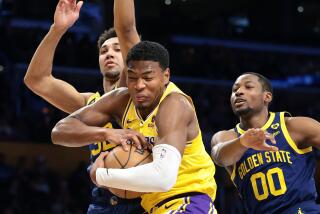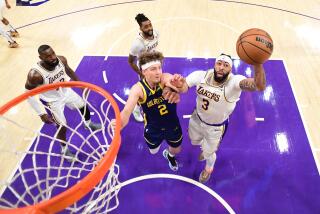A TRUE WARRIOR
OAKLAND — So, after taking eight years of his career, carving up his body and sullying his good name, the gods gave Baron Davis this postseason.
What followed is now called the greatest upset in NBA history, the Warriors slaying the mighty Dallas Mavericks as Davis personally trampled the best-laid plans of Dallas Coach Avery Johnson and Johnson’s guards.
Welcome back to Mt. Olympus, kid, where did you go?
“Ooh, is he good,” said Nuggets Coach George Karl, watching from Denver. “To be honest, I felt sick for Avery while I was watching it. I was sitting there thinking, ‘What would I do?’ ”
It represented one of the great comebacks in basketball. In January, averaging 20 points and spearheading his team’s rise, Davis was No. 10 among Western Conference guards in All-Star voting.
At No. 9, 70,000 votes ahead, was Dallas’ Jason Terry.
Having long since learned to handle disappointment, Davis barely said a word.
“You know, it doesn’t bother me, man,” Davis said last week. “I’ve always been a guy who’s been an underdog. Any bad incident, any injury, it’s like I fall from the top five to not mentioned at all....
“I’ve learned to deal with that through hitting rock bottom and I’ve realized it just builds a lot of character.”
Of course, who needed so much character?
He did.
Three months from arthroscopic knee surgery, Davis couldn’t practice during the Dallas series, but in the games, he put on a clinic in refusing to lose.
Dallas led Game 4 by 10 points in the second quarter and eight in the third. Davis ended the half by making a half-court shot and the third quarter with a steal he took in for a dunk, then led the fourth-quarter rally that rocked the Mavericks’ world.
The series was off the charts before Davis had his Willis Reed moment in Game 6, leaving with a hamstring strain in the first quarter, seeming to take his team’s chances with him.
He limped back into the game in the second quarter, found he could no longer blow by defenders, started firing up three-pointers, making three of four, and scored 13 points by halftime.
Davis shot 30% on threes this season and didn’t even make the top 100 in the league.
“The Lord works in mysterious ways,” he mused the day before, thinking back on his career.
It helps if you’re really good too.
In these playoffs, Davis is averaging 24.9 points a game, up from 16.4 points in his eight seasons in the league.
Carolina blues
When I was 5-5 in 10th grade, people used to say I wouldn’t go high Division I.... They said when I hurt my knee [at UCLA] that I’d never be the same.... My rookie season they said, “Damn, B.D.’s not going to pan out, he’s just another one of those UCLA guys who get to the league and don’t really do anything.”
-- Baron Davis, 2002
Having grown from Muggsy Bogues’ stature to Ronnie Lott’s, Davis thought he’d been through a lot by his third pro season, but his troubles had just begun. In his fifth, he suffered a herniated disk that brought his budding career to a halt. After missing no games in his first four seasons, he would miss 98 in the four since.
A lot can happen to a young player, but few get the entire treatment as Davis did, starting with the 1999 draft when his agent, Arn Tellem, tried to get the Charlotte Hornets to pass on him at No. 3.
Tellem once did that for another client, Kobe Bryant, getting New Jersey to pass on him so Charlotte could take him and trade him to the Lakers.
This was Davis, not Bryant. Davis says Hornets Coach Paul Silas told him, “We’re taking you, that’s that, deal with it.”
Davis would have more problems with the Hornets, but so would others, including Silas and the city of Charlotte, which bid the team adieu after a long fight over a downtown arena.
In 2003, Silas was shown the door, literally, after a 47-35 season. Informed he wouldn’t be back, Silas was told to go over to owner George Shinn’s house. There, Silas was told Shinn was in the shower and couldn’t come to the door.
Silas’ successor, Tim Floyd, went 41-41 and lasted one season. Hurt or disgusted or both, Davis played 18 games for Floyd’s successor, Byron Scott, before forcing a trade.
The Hornets settled for Speedy Claxton and Dale Davis in a trade-deadline deal with Golden State. Shinn called Davis “poison.”
Talk about coincidences. The Warriors had hired former Stanford Coach Mike Montgomery, who was already struggling with the skepticism that NBA players reserve for college people.
More than a little sensitive to suggestions he was at odds with yet another coach, Davis refused to acknowledge any problem.
When the San Jose Mercury News’ Tim Kawakami, who once covered Davis at UCLA for The Times, wrote the story everyone knew about, Davis went off on him, claiming Kawakami had been out to get him since his college days.
After last season’s 34-48 disappointment, the Warriors finally fired Montgomery. That made 13 seasons out of the playoffs, and counting.
The gods must be crazy
Jokers that the gods are, there was no hint until the very end that this wasn’t going to be No. 14 for the Warriors and another downer for Davis.
Hopes were high when General Manager Chris Mullin brought back Don Nelson, still an imaginative coach at 66 and, as Davis knew, the man who rescued Steve Nash’s career.
“A lot of people have forgotten about me or kind of written me off, but I believe in myself,” Davis said last fall. “I know there are 20 people in this room who believe in me.”
They were already fading by February when Davis’ left knee got so bad, he opted for arthroscopic surgery, performed by the Lakers orthopedist, Stephen Lombardo.
By Davis’ return, the Warriors were 26-35 and Nelson had counted them out, noting, “You can’t beat a dead horse.”
The horse then arose, starting with Davis’ return, a 111-93 win in Detroit, finished 16-5 and made the playoffs in what turned out to be its second-biggest miracle this spring.
Crews don’t come more improbable than theirs, with their zany coach, four-guard lineup and collection of dead-end kids.
Davis’ old UCLA teammate, Matt Barnes, is with his fifth team in four seasons. Stephen Jackson, who went into the stands at Auburn Hills, Mich., arrived at midseason with Al Harrington from Indiana, after a preseason incident in which Jackson fired his gun in the air to break up a bar fight.
“We talk about it,” said Barnes. “Me and Stephen Jackson kind of took a similar road, starting in the minor leagues. Baron’s been traded. Al has been traded....
“A lot of guys have a lot to prove and not only from that standpoint but from the standpoint of nobody thinks we should be here.”
Nobody can appreciate it more than Davis, knowing as he does it can end at any moment.
But what a journey.
The stars are turning out, including Carlos Santana, Jessica Alba, Woody Harrelson, Kate Hudson and Owen Wilson. In the jubilation of their first-round upset, Hudson, who attended Santa Monica’s Crossroads High with Davis, told the Mercury News, “He was meant to do this.”
Davis almost never doubted it, even in the days when he wondered why it was always him.
“You know what, I used to” say that, he says. “I just think my path in life is different than a lot of guys. It’s different from just any other basketball player.”
*
More to Read
Go beyond the scoreboard
Get the latest on L.A.'s teams in the daily Sports Report newsletter.
You may occasionally receive promotional content from the Los Angeles Times.










